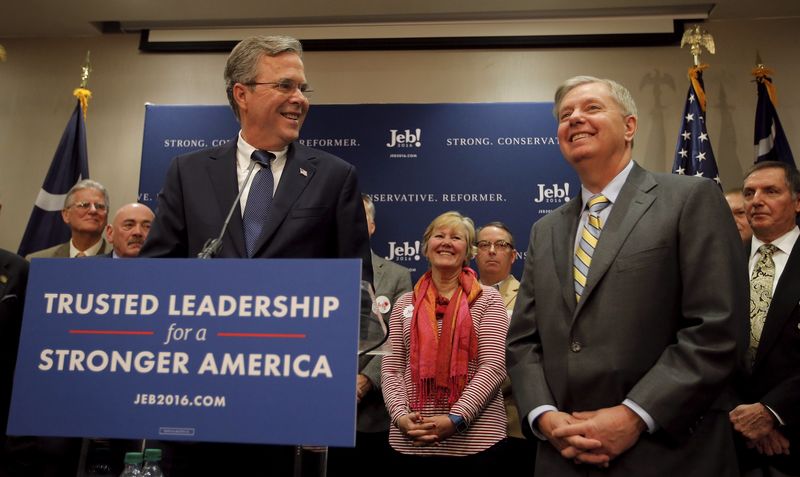By Steve Holland and Susan Heavey
CHARLESTON, S.C./WASHINGTON (Reuters) - Republican candidate Jeb Bush was endorsed by former rival Senator Lindsey Graham of South Carolina on Friday, winning an important ally in a state where a Feb. 20 vote could prove critical in the 2016 race for a presidential nominee.
The move by the hawkish Graham, who ended his own presidential campaign on Dec. 21, reflected his view that Bush offered the best plan to defeat Islamic State militants and to do so by forming alliances with Muslim nations in the region.
Graham's decision could be significant in swaying not only South Carolina Republican voters but also his good friend Senator John McCain, the 2008 Republican presidential nominee who remains an influential figure in the party and who has spoken warmly about Bush in recent months.
Graham said the vote in South Carolina, which will follow Iowa's caucuses on Feb. 1 and New Hampshire's primary on Feb. 9, will reset the race.
"Jeb Bush is going to be a nominee that can win an election that as a party we can't afford to lose. He will be the president that can reset the world, bring us together and solve hard problems," Graham said.
In making his announcement, Graham also said that a Bush rival, Florida Senator Marco Rubio, was, at 44, too young to be president. Rubio delivered a strong performance Thursday night at a debate of the top seven Republican candidates, an event that front-runner Donald Trump was seen as winning.
Graham, 60, said he believed Rubio would be president some day, but not following the Nov. 8 election.
Pointing to his own experience, he said at age 44: "I was not ready to be president."
Stung by a series of ads against him from the Bush campaign and the SuperPAC that supports Bush, Rubio released a TV ad on Friday, calling Bush desperate.
Bush waved off the attacks, suggesting Rubio has been too sensitive in the hypercompetitive political world.
"If you're a candidate, you can't play the role of victim, and he shouldn't either," Bush said.
Graham said Trump's proposed ban on Muslims entering the United States would complicate efforts to gain support from governments in the Middle East. At the debate, Bush had said Trump's idea was flawed and that a Muslim alliance was vital.
Graham, who has been a sharp Trump critic, said Bush's bid to woo Latino voters was also critical in widening the reach of the Republican Party, which has not won the presidency since Bush's brother, George W. Bush, was reelected in 2004.
Bush, said Graham, "wants to expand a party that desperately needs to grow."
Trump dismissed Graham's move on Twitter (N:TWTR).
"Sen. Lindsey Graham embarrassed himself with his failed run for President and now further embarrasses himself with endorsement of Bush," he tweeted.
